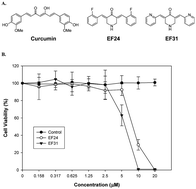Synthetic curcumin analog EF31 inhibits the growth of head and neck squamous cell carcinoma xenografts
Abstract
Objectives are to examine the efficacy, pharmacokinetics, and toxicology of a synthetic curcumin analog EF31 in head and neck squamous cell carcinoma. The synthesis of EF31 was described for the first time. Solubility of EF24 and EF31 was compared using nephelometric analysis. Human head and neck squamous cell carcinoma Tu212 xenograft tumors were established in athymic nude mice and treated with EF31 i.p. once daily five days a week for about 5–6 weeks. The long term effect of EF31 on the NF-κB signaling system in the tumors was examined by Western blot analysis. EF31 at 25 mg kg−1, i.p. inhibited tumor growth almost completely. Solubilities of EF24 and EF31 are <10 and 13 μg mL−1 or <32 and 47 μM, respectively. The serum chemistry profiles of treated mice were within the limits of normal, they revealed a linear increase of Cmax. EF31 decreased the level of phosphorylation of NF-κB p65. In conclusion, the novel synthetic


 Please wait while we load your content...
Please wait while we load your content...